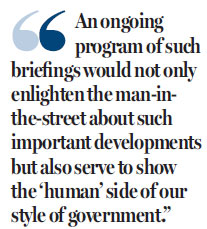ATV's demise offers the govt a wonderful PR opportunity
Updated: 2016-04-01 08:09
By Geoffrey Somers(HK Edition)
|
|||||||||
The crash of ATV has presented the government with a golden opportunity. It can set up its own TV outlet to act as a completely new arm of its publicity machinery, providing an ongoing stream of information informing the public about the multitude of never-ending government activities. It is not by chance or good luck that Hong Kong's success story continues decade after decade - it is thanks to wise and judicious direction from our government that keeps Hong Kong and its robust economy ticking over so successfully. So let the government fully capitalize on this wonderful opportunity that will be placed in its hands at midnight of Saturday (April 2), when government broadcaster Radio Television Hong Kong (RTHK) is to take over the operation of two former ATV analog channels.
But now comes the crunch - is it intended that these invaluable outlets will actually be employed to explain in simple and attractive style the reasons behind the latest government decisions, and to publicize the government's role in our latest important developments? Regrettably there are misgivings about what is likely to appear on our screens when we switch on to either of these channels. Instead of using them to provide interesting background programs informing viewers why the government is taking certain courses of action, it seems that one of the channels will mainly be pumping out programs aimed at ethnic minorities in our community. On top of this, the second channel is likely to be screening programs for the elderly every morning but from 3 pm in the afternoons programming will be switched to provide entertainment for children.
This would mean that instead of grabbing with both hands the potential publicity opportunities this offers to the government, it is to be virtually wasted and replaced by trivia.
We understand that RTHK has already spent HK$60 million upgrading its technology to handle this significant expansion of its services. But we must ask whether this could be considered money well spent if this golden opportunity is let slip by the government?
Where else in the world has any government had such a glorious publicity opportunity dropped into its lap? The timing for Hong Kong couldn't have been better - it is no exaggeration to say that our community as a whole seems not to know where we are headed, and is in desperate need of enlightenment and guidance. Senior officials can give televised briefings to explain to the public in simple terms why these changes are being introduced. An ongoing program of such briefings would not only enlighten the man-in-the-street about such important developments but also serve to show the "human" side of our style of government.
There is nothing mysterious about the process of government decision-making. Generally speaking, circumstances in our overseas markets might be subjected to churn, resulting in the necessity to make changes that keep pace with the latest situation. The government bureau involved painstakingly examines what is happening, and how best the Hong Kong ship of state can be steered back on to a safe course. The secretary of the relevant policy bureau having been deeply involved both in examining the problem and finding the best solution, is usually best placed to host a televised briefing to explain the issue to the public and why certain necessary changes are being implemented.
To add to the clarity and visual impact of the presentation, the briefing should of course be accompanied by televised shots of scenes relating to the various points the speaker is making.
Having explained above how the government carefully reaches its decisions, may we be bold enough to ask which government bureau studied all the possibilities provided by the acquisition of ATV's two channels, and decided in its wisdom that the needs of ethnic minorities were greater than any other particular audience grouping?
May we also ask whether these programs will be presented in the languages of the main ethnic groups now living in our community, and who will be monitoring the programs to ensure, for instance, that political aspects and religious influences do not creep in?
This brings us to some other important questions - for example, will RTHK be engaging staff from our main ethnic minorities to present the programs, or outsourcing these jobs to people claiming to have experience in this particular field? And since screenings are expected to begin at 8:30 am and continue until 1:30 am the following morning - a total of 17 hours daily - how many extra staff will be required not only to present the programs but also to perform the ongoing technical duties? To achieve a fair spread of the work it looks as if three shifts will be required for both channels, but the deadline is just a day away. Is it realistic to assume that it will be a smooth launch?
With fingers crossed, we hope our fears are misguided and that the re-launch is an improvement on ATV.
The author has spent over 40 years working as a chief information officer in several major bureaus and departments of the Hong Kong government and in various senior English media positions in Hong Kong.

(HK Edition 04/01/2016 page10)